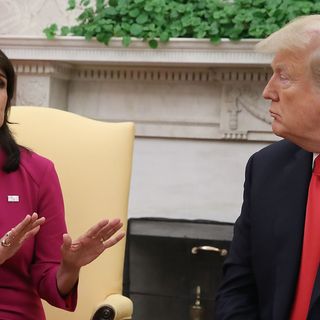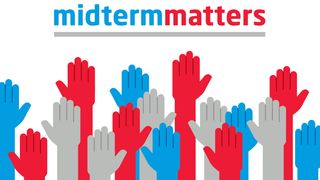1. The politics of hurricanes
Hurricanes can also blow ill political winds, as George W. Bush found out with Katrina in 2005. The horrific loss of life, especially in New Orleans, and the tardy and poor response to the survivors created an impression of incompetence by the president and his administration. Katrina’s aftermath was seen as contributing to the Republican loss of both the House and Senate in midterms one year later.
Voting is hardly the major priority in those areas flattened by Michael. And those areas include counties where Trump won by 60-70 per cent in 2016.
In Florida, Hurricane Michael has also inflicted devastating damage (thankfully, thus far, with a relatively small loss of life), but the rebuilding will take years. Florida Governor Rick Scott is clearly doing all he can, and President Trump, a staunch supporter, will be in Florida later this week. Scott is locked in a major battle with longtime Democratic Senator Bill Nelson – who appears vulnerable, and if he loses, that is one more seat in a tough year for Democrats to make up in the fight for Senate control. But here’s the twist: the election is three weeks away. Voting is hardly the major priority in those areas flattened by Michael. And those areas include counties where Trump won by 60-70 per cent in 2016.
A significant part of the Republican vote in that part of Florida could be depressed – providing a cushion for Nelson and also Andrew Gillum, the Democratic candidate for governor. Scott and Trump will show the flag and bring heavy machinery and open wallets to the Florida panhandle, and their residents will be grateful, but these loyal Republicans may have other things to do than vote on November 6.
2. Markets and the midterms
After reaching record highs just 10 days ago, markets headed toward correction territory and it undercut Trump’s midterms narrative. What was coming through the noise of the significant losses – but still around 5 per cent off peak, and with the market still up for the year – was that the selloff was caused by rising interest rates driven by a strong economy further juiced with US$3 trillion in deficit spending (the deficit impact of the tax bill and the budget), and with no visible end to the trade war with China.
Trump’s Make America Great Again rallies have always – to the consternation of Republicans running – underplayed the benefits of the tax bill and the economy’s performance. The economy is Trump’s best issue. The shakiness in the markets – and October is often a cruel month (think 1929, 1987, 2008) for stock markets – clouds a key Trump message when it is needed most.
3. What is Kanye West doing in the White House?
He will not win the African-American vote for Trump or the Republicans. Aside from the shock value of some revolting epithets being uttered live on C-SPAN across the Resolute desk, why was Trump taking two hours out of his day when Florida was reeling, a major foreign policy crisis was building with Saudi Arabia, and the markets were tanking? As Mr West was talking about the complex notes in his personality for more than 10 minutes, Bill Kristol, a staunch conservative, observed: “Putin’s killing people in the UK, the Chinese regime has created a massive Uighur gulag, and the Saudis have murdered a journalist who was living here. None seems to fear serious consequences from the Trump administration, as the world becomes a darker and more dangerous place.” Or, as Kanye said to the president, “If he don’t look good, we don’t look good.” After the cameras left, Trump and Kanye had lunch.
4. Nikki Haley checks out
Where to next for Nikki Haley?

The US ambassador to the United Nations left with her head high and with respect from across the political spectrum. There was an initial flurry of speculation that Ivanka Trump might be appointed. Her father voiced that the issue of nepotism might be raised, but the real reason she was never a contender is that the position requires Senate confirmation, and that would have provided a major wedge into the Trump family finances. Trump was never going to permit that to happen. Now, The New York Times is reporting that Jared Kushner, worth over US$300 million, minimised his federal taxes.
For Haley’s political future, anything is possible. But a lot depends on when Trump’s time in office concludes. If he wins re-election in 2020, Haley would face the hurdle of a third successive Republican term. Except for Reagan-Bush 1981-93, no party since Roosevelt has held the White House for 3 consecutive terms. If Trump is defeated in 2020, Haley would be an obvious contender for ’24. But six years is more than a lifetime in politics.
5. This week’s cautionary tale
Presidents have learned the hard way never to comment on stock market movements – or the value of the dollar. But not the 45th president, who can’t resist taking credit for an up market, and blaming the Fed when the market recedes. The political problem it creates for him is that, once again, he owns it on the way down as much as on the way up – maybe even more.
In October 1997, the markets where very shaky – in percentage terms, under more pressure than today. Treasury Secretary Robert Rubin stood on the steps of the Treasury after the NYSE had closed down heavily for the day and said simply: “It is important to remember that the fundamentals of the United States economy are strong and have been for the past several years, and the prospects for continued growth, with low inflation and low unemployment, are strong.” And that was it. The panic was over. Zip comment on the DowJones. Not a word of guidance to the Fed. The boom soon resumed. Clinton left office with record popularity figures.






